Billy Friedkin Talks KILLER JOE and So Much More
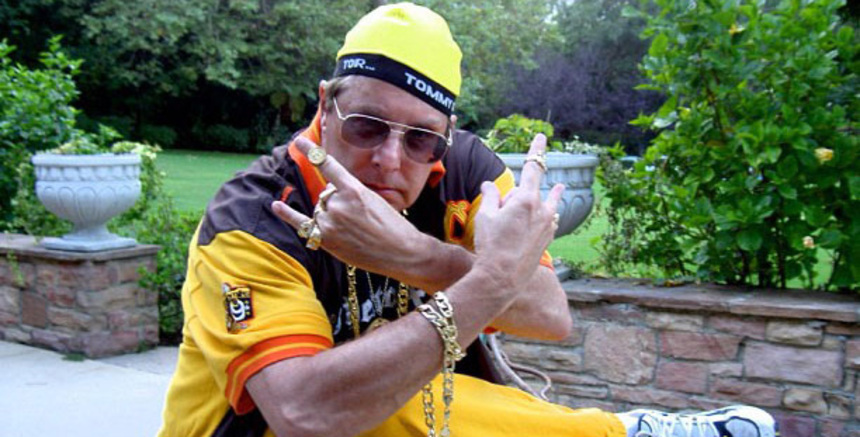
Earlier this week I had a chance to talk with a Hollywood legend for well over an hour. From working with Hitchcock, to his extraordinary success with The Exorcist and The French Connection, through to his edgy and vital new works like Bug and Killer Joe, the unapologetically loquacious titan of 70s cinema discussed everything from what he learned from live television, his derision of comic book movies, and how certain Blu-Ray releases were rescued from forever being, in his words, "shit".
We began by talking about his latest film, the beautifully vulgar and extremely compelling Killer Joe. Last September, I referred to it as a "dark, vicious little character piece", and called it a "a taut, well directed film" (my full review is located here).
ScreenAnarchy: Do you think that the making of Bug, and working with Tracey Letts, changed the way you're making films these days?
William Friedkin: It really hasn't changed the way I make films at all, in the sense that even some of the films that had far larger scale, like The French Connection and The Exorcist, are still very claustrophobic.
The French Connection , which was shot all on location, even the interiors, there were no sets. The Exorcist was shot all over the place, including Mosul, Iraq, they're both very claustrophobic, despite the fact that they're not really confined to one location. About a third of The Exorcist is confined to the little girl's bedroom, before she's possessed and after.
The characters I'm drawn to are trapped within their own skins, so it hasn't changed, the material that draws me. There's just less of that kind of material around.
The Exorcist was based on a novel, The French Connection was based on a true story, they come from various sources, the films I've made, but they all seem to have at least this claustrophobic nature in common.
Why do you think that is?
I'd have to be a psychiatrist to tell you why that is, but I am drawn ... Look, I think everybody, at one time or another, and sometimes people throughout their lives, feel trapped in their own skins. Without giving voice to that, or looking for that sort of thing, I have found that in certain works, or imposed that on other works.
One of my first influences was Harold Pinter, and he wrote about what goes on between the lines. That's where most of us live, in the spaces between the lines.
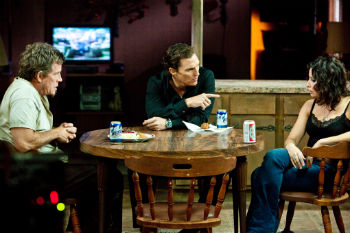
Can you talk about how you elicited the performances in Killer Joe? You're on record as saying you don't like to do lots of takes, did that result in a more strenuous rehearsal process?
No, I don't rehearse a lot either.
The first important thing a director does is select the material that he or she wants to do. It seems to find me - I've only done 16 films in 45 years. I did a good deal of television before that, I did live television.
The second most important thing a director does is [assemble] the cast. I go through the process where if I'm interested in an actor, or they're interested in doing this, I'll meet with them, and talk with them at great length. I'll get to know as much about them as I can, and we'll discuss the material, so that if I do wind up casting them, they know exactly where I stand with this material, and I know enough about them to try and push the buttons that bring about the performance.
Then when we get to the stage, when we're going to shoot, the only thing that I'll give them, I usually give it to them the night before, is the choreography, the movement. "You're going to be over here, when you say this, you're going to be over there." I used to rehearse in the old days, and I found that the rehearsal took away the spontaneity from the performance
What I look for now, and for the last several years, is spontaneity, not perfection.
I rehearsed The Exorcist for six weeks, I could have put it on the stage. By the time we got to film it, I thought it was frozen, thought it was dead on arrival. When we started shooting, the actors were doing exactly what we rehearsed, I stopped and said, "look, forget everything we've done. You know these lines, you know what has to happen, go out and do it in your own words and find those feelings anew. Forget everything we said, forget even the staging." I've never rehearsed since because of that experience.
This was not something I was going to put on stage that had to be perfect night after night. I don't look for perfection, I look for spontaneity,
I do know you worked for Mr. Hitchcock [as part of the Alfred Hitchcock Presents television show] - is the story of him being upset at you not wearing a tie apocryphal?
No, it's absolutely true.
Obviously Mr. Hitchcock was celebrated for being very meticulous with his planning. I assume with live television it's a different mode of working, but I see echoes in what you're still doing these days.
I don't feel I've gone back, Jason.
I still see echoes in the skill set that you bring to your films. Take for example your 12 Angry Men, which I think is an exceptional production, one of your most underrated works. It not only compares favourably to Lumet's version, it's in many ways superior to it. It was obviously not shot live, but I think that there's such a vitality that you elicited from a taped performance that it feels almost entirely like the actors are delivering their lines with an immediacy that you sometimes get from live television.
For me one of the things that's enthralling about Killer Joe is that same sense of vitality, that you felt like it was really happening. You're made to feel uncomfortable because you felt you are witnessing something rather than something that's merely being staged.
I think that's true. I'm glad that it came across that way to you, but I definitely feel that that's true.
I go for that.
What I learned from live television, what I have gone back to, what I've carried with me since, is that I learned very quickly that it's about communication. Not only with a cast and a crew, so that you can get what you want, but you're ultimately trying to communicate with an audience.
Now you can't communicate with everybody. But as a director, you're constantly working on the means by which you can make the audience forget there's a camera, forget these are actors, and just get caught up in the drama.
There are a lot of guys that do it by dictat, "we're going to do this, we're going to do that", and I can almost see that in their films. I can see that the actors are merely doing what they're told, instead of being free to create because you've communicated to them their ability to relax, and create, and not feel that they're being judged.
Do you have a specific example that comes to mind (without offending anybody)?
All of these super hero films, I can't even watch them anymore. It's just a lot of... Forget the stories, which are really directed at children, I don't believe it.
That starts with the story. There are even some serious films... I don't want to knock anybody else's film ... I'll see films today that aren't about superheroes, and I just don't believe the performances.
I can see where they're told to hit a mark and say their line, then they hit the mark and say the line... I just don't think that a lot of the films today breathe. You're probably too young to remember the films of John Cassavetes, and the way that they just breathed life.
There were many others, people like Billy Wilder could get very spontaneous performances from people because he could provide an atmosphere where people could feel free to find the characters within themselves.
I don't see a lot of that today.
Now, it doesn't seem to bother anybody else, you know. Millions and millions of people enjoy these films, and that's fine.
I'm affected by things that I don't think are well done, they're just by the numbers.
It's funny you mention Billy Wilder. When setting up this interview, you were referred to as "Billy", and of course you've been credited with the more formal "William". I see it in part as the difference between Billy Wilder, a slightly looser filmmaker, and the more formal William Wyler. Is this a choice between two styles, or am I making too much out of this?
Nah, the first credits I got said "William Friedkin".
I knew Billy Wilder very well, and I used to call him Bill, and he'd call me Bill. Everybody called William Wyler "Willie", that's how he was known in Hollywood.
The credits always seem to read more formal, because that's how you registered with the director's guild, under your formal name.
It's just amusing to me that the formality seems to carry over slightly to the stylistic, and for whatever reason by using your full name it seems to add a formalism to your work which in discussing your work isn't always indicative.
For example, I'd assume it was a Billy Friedin, not a William, that would dress up as Ali-G for a twitter photo [see above], whereas a William Friedkin seems slightly more staid. Take that for what it's worth.
[Laughs.] The Ali G photograph was a bet that I lost that I never wanted to fulfill, but the guy that won the bet brought me all the gear. He and his wife brought the camera, and they insisted that I pay up.
I proposed that whoever lost this bet dress up as Ali G at dinner. I never really expected to have my picture taken that way, but there it is. So I just put it up on Twitter. That was years ago, when he was still on the air.
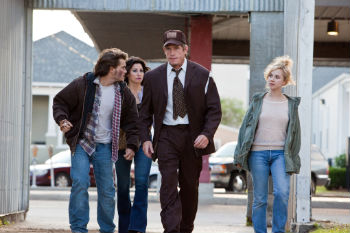
There are people that will take a film like Killer Joe and miss a sense of playfulness. It's an incredibly dark story, but it's also a very funny story, there's some very darkly comedic elements. Because a lot of people know you from these more dark or visceral films, they'll look at this and have that humour slip by. With the likes of the Coen Brothers, there's an expectation of the dark/comedic elements.
Yeah...You can't avoid preconceptions, there's nothing to be done to avoid that. Hopefully people like yourselves and other critics will point out what this is.
Not everybody gets it in every way, not simply the humorous side or the dark side. There are people that don't like Gone With The Wind, and I'm one of them! I don't like it, yet it's probably one of the most beloved films ever.
I've never seen Gone With the Wind - I probably should as a film critic, but I feel like I've seen most of it already
It's one of those great films that I've never been able to connect to.
The only film I think that most people agree on is probably The Godfather. Very few people hate The Godfather, it's a real classic epic. Very few people hated Gone With the Wind, but I can't watch it. I tried, many times, I find it laboured... But there's no doubt that it's a masterpiece.
Connecting it back to the American Zoetrope and Coppola connection, could you talk about working with cinematographer Caleb Deschanel?
We were social friends for a number of years. He did the film The Hunted with me before this. I just like him as a person.
He went to USC film school with George Lucas, but it isn't through that that I know him. I never went to any film school. I met both of them [Lucas and Deschanel] socially years later.
Caleb had over the years developed his craft and ultimately his art as a result of everything he did. I don't know how much of it came from film school.
I know they were a pretty lively bunch of guys that were trying to push boundaries.
Did you see yourself as part of that community back in the early 70s? Did you see yourself as part of that Bogdanovich/Lucas/Scorsese "thing", or because you had been working more steadily, did you align yourself more with someone like say Coppola, someone who was already in the system making his mark.
Francis was a good friend of mine in the 70s, the other guys I knew less well. I knew them all, but Francis and I had a real affinity for one another, and still do. I just think he's a lovely, wonderful person, and that's about it. I was not part of any group. Now, a group formed around Francis, and Lucas was a part of that. I'd see Lucas around, as sort of Francis' assistant or amanuensis.
Excellent word, very Catholic...
One of my pet peeves often takes place in the translation of a play from the stage to the screen. Often it can become too "stagy". What sort of challenges are there, in terms of scope and tone, translating from one medium to another.
The very best examples of that are probably exist in films other than the plays that I've done.
Are you aware that Casablanca was a play? One of the greatest movies ever made, is considered to be Casablanca. That was a play originally called "Everyone Comes to Rick's". In fact it was an unsuccessful play - it didn't run a week in New York. But everything that's in that play is in that film, including the characters and the setting.
The film was all shot on a soundstage, except for the very last scene at Burbank Airport when Ingrid Bergman and Paul Henreid are leaving.
Nobody talks about Casablanca as a play any more.
A Few Good Men was a play. Cabaret, of course. A Streetcar Named Desire. It's only in recent years that people say "oh, that was a play". That has nothing to do with anything unless you photograph the play on the stage, unless you take a live performance and shoot it from beginning to end.
That's not what I've done.
The plays that I've adapted, they all exist as films.
A lot of critics get off on revealing their origins, but that wasn't the case years ago. The very first screenplay writers were playwrights, because they knew how to write drama. When sound came in, Hollywood went to the best playwrights.
Films come from many sources, some are plays, some are original stories from the imagination or newspaper or magazine articles, some are novels. They have to be looked at, and appreciated as films. They either are or they're not.
There are no specific ground rules for adapting a play to film, other than you don't want to shoot it off the stage.
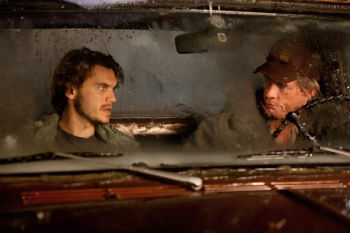
Can you think of specific things you can look to avoid, or is it far more organic than that?
What Tracey Letts did with this, for example, he wrote this as a screenplay. He drew on the core characters and core situations of what he wrote as a play, but other than that, he wrote an original screenplay, that has more characters than his play, it has more situations.
There are 23 or more locations... There are more locations in Killer Joe than there are in Casablanca!
I tend to be more sensitive to that because, frankly, I've been raised on film much more than I've been raised on theatre. When I'm watching a play, I find it much harder to suspend my disbelief. I see a performance as much more of, well, a performance.
I'm sure that that's true. That's true of your generation. There aren't many great plays written today. There are far fewer great plays written today than in the golden age of theatre, so I don't blame you for that. It's what I said earlier, a staged performance tends to be more stagey.
You cannot consider the performances in Killer Joe as being stagey! Matthew McConaughey is tremendous, but it's Gina Gershon's performance that's the most riveting and wrenching at the end.
Can you talk about the challenges of maintaining the tone of varying intensity throughout the shooting schedule?
I never approached the last part of the film any differently than the first part. I tried not to make a big deal about it, I tried not to build an atmosphere where we're coming into the deep, disturbing, serious part.
I tried to keep the same mood for everything we did, and not emphasise anything as being outsized or edgier or anything else. I just created a space where they could feel free to give of themselves, to find these characters within themselves. That's really what an actor works off of, not simply what's written on the page. What the director's doing is to try to help them find these characters within themselves. "Sense Memory" is what it's called.
When you're doing a scene where you're angry, or scared, or joyful, or whatever, you're drawing on sense memories of when you felt that in an earlier time in your life, often in your childhood. That's what I would try to do.
When I told you earlier that I talk to the actors as soon as I cast them about who their characters are, I learn certain things about them that I can use to help them draw on their sense memories, to portray fear, or terror, or comedy, or whatever it might be. But I don't try to do, "Ok, folks, now we're going to do the chicken bone scene!"
No, there's none of that, it's all of the same piece.
I want the same honesty in portraying that, and the same consistency of character that they established at the beginning of their performance, you want that at the end. But you don't want it to stand out.
Obviously that action, the action of the final ten minutes, is heightened. But that's the way it's constructed. It's not something I say, "All right, guys, now we really have to get serious here and figure it out." They don't need to figure it out more than any other scene we've done.
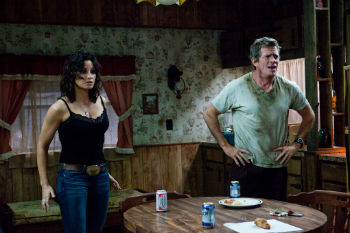
How much of a challenge, then, is it to ameliorate or attenuate that performance throughout the shoot? I assume, for example, that it was not shot in sequence.
WF - We did all the locations first, which are way out of sequence. And then, when we got to the interiors, then I shot in sequence. Meanwhile, because the exteriors and the locations are peppered within and all over the story, they had to know where they were going at all times, they had to prepare these characters before they ever got to the set. And we did that through the conversation, and the choreography, but not through extensive rehearsal.
How manifest do you make motivations, or are you relying upon the actors entirely for that aspect of character?
I'll give you an example: With McConaughey, we both agreed that what Joe was looking for is what Dottie is looking for, and that's family. They're looking for a sense of belonging to someone.
Dottie is obviously in a situation like a modern Cinderella - she has an evil mother, she has an evil step-mother, she has a father and a brother that are trying to pimp her out, and really don't give a damn about her, and she, like Cinderella, is looking for Prince Charming.
Joe is a guy who is obviously a loner, he can't share the details of his life with anyone, except when he comes on the scene, he and Dottie recognize each other, and recognize their mutual need for family.
Joe, obviously, comes from a dysfunctional family, that allowed him to be both a detective and a hired killer.
So Joe becomes Dottie's Prince Charming, but he's a hired killer!
You think about the women that hook up with really evil men, and give their lives to these guys, they're all looking for Prince Charming, and they tend to overlook the faults that are in these guys.
Killer Joe is about family, and it's about people trapped within their own dreams. Their dreams of getting out of this situation have blinded them to a sense of reality or morality.
So, that's the conversations we would have.
I actually described it as "a fairy tale with bite."
Yeah, that's right. That's pretty good.
I talked to Juno [Temple] and Matthew about the Cindarella myth. I discussed it with Tracey Letts. It had never occurred to him!
When you write a play like that it's automatic writing, when you write a film script like that it's automatic. You don't start thinking of metaphor. You think of the characters. But now that he wrote it, I have to interpret it. And my interpretation is what I just told you.
This is not a Disney version of the fairy tales, but much more in line with the originals, where they were sawing off the back of their ankles to fit the glass slipper upon their feet.
The Brother's Grimm from which they all derived are horror stories ...
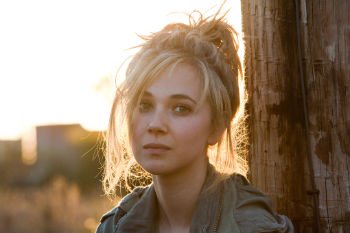
Specifically they're morality tales where people are in situations, often being trapped, and about how they react when they come out of a closed, claustrophobic situation, how they would have their humanity rise to the surface after an abuse, and I think that's very much in line with what you drew out of the story of Killer Joe.
I think that's correct.
Remember that all of this analysis is after the fact. Before the fact, I try to talk about the characters in realistic terms. I don't go into backstory, because what is not on the page is not necessarily true.
Every major writer I worked with, like Harold Pinter, and Bill Blatty, and Tracey Letts, they don't know what happened before this story started, they don't know what happened to these people, they don't know where it goes after it's over!
We never even speculated what might happen to Joe and Dottie.
One of the last shots is her finger goes from the trigger guard to the trigger. You don't know if she's doing to shoot him too - you can speculate about it.
Something has been released in her, a rage that she had supressed throughout the whole story.
She might kill him, but I don't know. Or she may be caught, and pay the price for murder, but I don't know that, because it's not on the page!
I think one of the things you respond to when you refer to "adult cinema" is that you leave some of those questions unasked or unanswered.
I leave that with the audience on purpose. I want the audience to go home and debate the film, talk about it, discuss what they like, what they didn't like...
That's what it used to be like in the 70s.
That's why the 70s were a golden era, and for no other reason. The films, you took them home with you. They were not just opium for the eyes, while you're sitting there chewing popcorn. They were films you could take with you, and debate, and argue about, and there were no final answers.
This is true of the great literature I love, and great works of art, great paintings. You can take them home with you.
There are some, I think inaccurately, that will describe what happens to the female characters in this film as misogynistic.
Tracey Letts and I, I can tell you, are not misogynistic.
We love women. I don't regard woman necessarily in terms of their natures as being any different from men at all.
I mean, I'm married to the same woman for twenty five years
Mazel tov!
We have disagreements, we have agreements, we both love and respect each other. I don't deal with her as a woman, she doesn't deal with me as a man, we deal with each other on our own experiences, and that's all.
I know that Tracey, who's never been married, has been in a number of long relationships, and they didn't end because he's misogynistic.
Look, it's very important to understand, we don't look at these characters as hicks, or rubes, or imbeciles, we don't judge them. This is what goes on!
We look at these scenes, and we say, "We believe this!"
Tracey and I have the same worldview. There are men that treat women terribly, you know. I think probably in everyone's life, because men and women are different in so many obvious ways, that there are disagreements. But if they argue, or they fight, it doesn't mean that it stems from misogyny.
It stems from the human conflict, from the crooked timber of humanity. It's a phrase from the 19th century philosopher Immanuel Kant, who said something along the lines, "from the cooked timber of humanity nothing straight can be made", or words to that effect. [ed."Aus so krummem Holze, als woraus der Mensch gemacht ist, kann nichts ganz Gerades gezimmert warden" - Kant, Idea for a Universal History with a Cosmopolitan Purpose ]
As a former philosophy major I'm pleased you're bringing Kant into the discussion.
It's very important, because he points out, the imperfection in humanity, the absolute imperfection in people, which makes for drama. If everyone agreed about everything, it'd be a very dull society.
Unfortunately, the countries in the world disagree on too many things, so I think we're on the brink of war, once again.
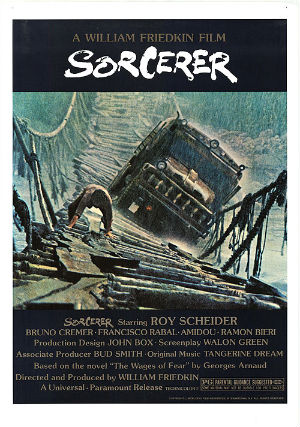
I have lots of people who are wondering about the status of Sorcerer.
Paramount and Universal produced Sorcerer in 1977. They made a very bad VHS, and never wanted to make a DVD.
What they have allowed for the decades since Sorcerer, they've allowed the prints to be screened by universities, and film societies, and art houses. They even made a new print last year, for the American Cinematheque. They had lines around the block, and they could have run it ten days or more. They had this one screening, and I went to it, I did a Q&A, it was great, people loved it.
Now, there's this group in Los Angeles called Cinefamily, and they have several thousand members, and they screen classics. They requested a print of Sorcerer, and they were told by both Paramount and Universal that they no longer owned it and they didn't know who did, which is total bullshit, as they had made a new print last year.
So, I started to call people there, and I got the same answer from even the guy who's the head of Universal, who I've known for 40 years! So, he's in the dark about it.
So, I had to bring suit against both studios. If it's true, that neither one of them still own it, then I want to own it, simply to make it available on DVD and Blu-Ray and to have it run by universities and film societies.
I'm not suing them for money.
I said in my lawsuit, which is in front of the 9th District Court of Appeals, that if there are any funds that I derive from this suit, that they'll be devoted to film preservation.
Where it stands now, the judge who caught the case has ordered that these settlement conferences are to be resolved by November 26th of this year. If they're not resolved, he has set the case over for trial, for a full trial in March of 2013.
I'm trying to get it back for the thousands of people that have requested it! I have at least a half a dozen great companies that want to distribute it on DVD and Blu-Ray!
My vote's for Criterion!
I'm surprised that the studios didn't cave in right away. There's a lot of chicanery in what they did, when they put this film and many others in an offshore company that no longer exists, and could never do business in the United States. It was simply a company that they formed to distribute their films overseas.
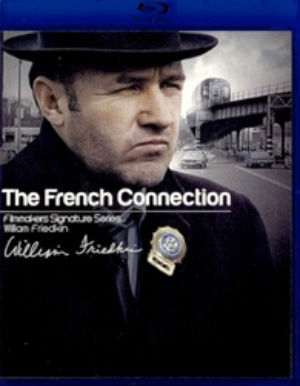
Can you address the similar debacle with the French Connection Blu-Ray?
Here's what happened.
The original master that we made back then, what I saw, is perfect. I never saw any of the copies they made. The copies go through four different companies, making different stages of the disc.
Owen Roizman, the cameraman, bought a copy at Best Buy. He took his copy home and it looked like shit.
He went nuts, and he called me, and I said, "Hold on Owen, the master looks great", and he said, "this copy is shit, Billy!"
He brought his copy into the video house where we made the masters, and we put them up side by side on monitors, and he was right, the master was great, the copies were grainy, and the colour wasn't there, he was correct. We ran both the master and copy on different systems, and the copy was bad.
In fact, when they sold these copies, they put in the little leaf, inside the front cover, as a warning to buyers that you might find that this copy doesn't play well on your home video receiver, so send us an email to www something, and we'll send you a disc that will run through your playback device to make it compatible with this new technology.
And this was bullshit.
So, we made a brand new Blu-Ray of the French Connection, and I brought Owen in with me. As far as we know, the copies they made, from one house now, by a different manufacturer are fine. And those are signature copies, it has my signature on the front cover of the film.
The other copies are shit!
I can't look at every damn copy they make, it just so happened that the cameraman bought one, and it was terrible, and it's his work, and he was right!
One thing that came out of this were those arguing about whether it's your right for the film to look the way the director wants it to look, even if it diverges substantially from the original intent of the first release.
The choice of the colour and the density is mine, but the point of it is, all I was ever trying to do was make it look what it looked like when I looked through the viewfinder. I wasn't trying to change anything!
Now, you have to adapt to the new technology, if there's scenes in black or darkness, you have to make them blacker in a video procedure, it's not the same as printing 35mm. The difference was not to change the look, it was to revive the look to what it first looked like when we printed it.
I supervised all the prints when they went out originally. I never thought I had to supervise copies of a digital master, and yes you do! So I hopefully will never make that mistake again. So, it was a series of errors, that I know hurt the film on digital. But, I felt that the cameraman was right - he had been long retired, I didn't even contact him to look at the master, I simply told him, you know, all I plan to do is make it look like when we first saw it, and he said, "great!"
He came in and looked at the master, and said, "Great, the master's wonderful!" So I brought him in on both Exorcist and French Connection while we were colour timing them.
You have historically been updating some of your films, do director's cuts for you supplant the originals?
Any new process requires a new technical approach. They record people differently than when they had 78rpm, and 33 1/3 lps, and now you have CDs. The equipment that they are put through is completely different. You no longer have record scratch, you no longer have incidental noise, you now have a clear, full sound. Yet there are still purists that say it's not as good as a 33 1/3.
I don't agree with that!
Every time you take something like The French Connection, and you try and take that negative through a new process, you have to adapt to the process. It does not adapt to you, you can't just put it up on a rack and transfer it straight across, you have to make certain adjustments that you had to make to the film when you printed it originally. You have to make the blacks black, you want the whites white. 35mm does not have the output that digital has, so there's always an adaptation.
In the case of the director, if the director's still alive and wants to do it, it's his choice.
For The Exorcist you actually modified your film ...
What you're talking about, the version we released in the year 2000, and it's called "The Version You've Never Seen Before".
All I did was put back 12 minutes of it that I originally had in the film, and then cut back. I didn't want a film that would run for more than two hours. The original cut was 2 hours and 12 minutes.
Years later, Warner Brothers came to Bill Blatty and me, and said, "look, if you look at the 12 minutes that you cut, it's up to you, but we'll release it theatrically". And I thought, "this is great!"
So, Bill Blatty and I looked at the 12 minutes I cut, he wanted to do it, and I thought, you know what, this film has been playing the way it did for years, and I thought, hell, the people who have loved this film for all these years, why shouldn't they see what I cut. It wasn't bad, it wasn't shit, it was just a choice I made at the time.
So, we put it out with the 12 minutes put back in. I believe when they re-released it they also put the original disc in there with it so you can get both, retimed for colour and density. It's called "the version you've never seen", it's not called a director's cut, because I frankly did it because I felt, what is this going to hurt? All the people who love the film so much, they want to see stuff that we cut.
There was that famous spider walk, where the girl walks backwards down the stairs. I had taken that shot out of the original because you could see the wires, you could see the wires that were holding her up. We didn't have CGI then.
That's the only shot that I used CGI in on the re-release. I used CGI to erase the wires, so that shot's back in the film, and 12 minutes of material to underline the spiritual aspect of the film
It's a fundamental question though - what do you see, for a first time viewer, which version should they watch?
I have no idea.
I like them both. I don't dislike the new version. And I think now I could have easily released the film with those 12 minutes added, but at the time I had an almost knee-jerk reaction that no movie should last more than 2 hours.
It might involve you psychologically, you might be into the story, and very actively following the events and the characters on screen, but that your ass would get tired. So I cut 12 minutes out only, because it was too damn long!
The French Connection, which came out a year or so before, was an hour and 40 minutes, and I thought that was an ideal length for a movie. And Killer Joe, it's an hour and 43 minutes, with about 3 minutes of credits.
That to me is an ideal length for a movie, because my ass does get tired!
I have to ask, are you enjoying being on Twitter?
I love Twitter! I love to be able to communicate quickly like that. It's a great lesson in how to communicate without being long winded, and I tend to be long winded.
I suffer from the same defect, sir.
In preparation for this interview, I've devoted some time to think about my experience with Killer Joe. I saw it in the middle of a film festival. I'm interested in seeing it again, and giving it the space I think a work like that needs to embrace it. Outside of its shock value, I think it's a really interesting film at its core.
Thank you very much.







